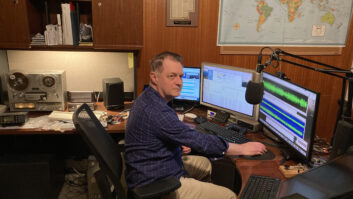U.S. international broadcasting is dysfunctional and it is time to initiate vast changes. The Broadcast Board of Governors has done enough damage to the U.S. public diplomacy.
We, the authors, have been associated with both VOA and RFE/RL our entire professional lives. We have been openly critical of many decisions reached by government policymakers affecting U.S. international broadcasting operations. But never more so than during the last eight years since BBG was created in 1999 and placed in charge of delivering our nation’s public diplomacy messages.
Members are appointed by the current president and given full responsibility for oversight of all U.S. non-military international shortwave broadcasting. The board consists of four Democrats and four Republicans plus the non-voting U.S. Secretary of State.
Rather than remaining an oversight committee, it wasn’t long before the BBG basically took over day-to-day operational control of all the radios. None, repeat none, of the board members has any experience in international programming or in the technical operations of shortwave broadcasting. A few had experience in commercial U.S. AM/FM markets, also with the Internet and satellite TV.
One such appointee was founder and chairman of Westwood One, a 1,000 AM/FM station nationwide network. It became immediately evident to interested observers that the BBG considers high-powered shortwave as something from medieval times. Neither did it appreciate, nor understand, the technical properties, capabilities and value of mainstay shortwave facilities.
The board began eliminating stations almost immediately, and started re-allocating associated funding to create technology with which it was more familiar. One needs only look at the United States’ failed public diplomacy programs around the globe, but particularly in Russia, to see what catastrophic results these efforts have wrought.
The BBG has already eliminated the following irreplaceable shortwave facilities:
- Number of Sites: 8
- Number of Transmitters: 71
- Total kWs: 22,500
- Total Effective Radiated Power kWs: 2,400,000
Unfortunately, once you relinquish foreign government-leased sites, and simultaneously forfeit all assigned frequencies back to the International Telecommunications Union in Geneva, Switzerland, they are nearly impossible to regain.
There is no doubt in the minds of experienced shortwave broadcasters that the Internet, satellite TV, medium and shortwave can all play a role taken together in an effective public diplomacy program. But you must have the technical knowledge and expertise to calculate which combination produces maximum results for a given area.
Contrary to BBG beliefs, there are millions of people in the world who do not have access to either the Internet or satellite TV. They still depend upon their world-band shortwave radios for outside information and news.
A prime example of the need for dependable, strong shortwave radio can, once again, be found in our old nemesis, Russia. Freedom of the press has been extinguished and there is a crying need for the free world to broadcast unbiased news to the masses of Russia. Shortwave has always been the only medium capable of reaching a maximum numbers of ex-Soviets.
The irony in all of this is that the BBG recently cancelled the unexpired lease on the one shortwave location that would have guaranteed our nation’s ability to impact and affect events in Russia. The facility was the irreplaceable site located at Playa de Pals, in eastern Spain.
The station stood on a pristine beach with an unobstructed one-hop signal path straight into beautiful downtown Moscow — the most ideal transmitting site for this purpose on the planet. With its abandonment, the Spanish quickly emptied the buildings and demolished the station’s mammoth 530 foot towers supporting 28 dB gain curtain antenna arrays last spring. See http://youtube.com/watch?v=LT5F9nvtyWo.
Save Kavala
Once again, the BBG is readying to close another valuable U.S. property, the only one still capable of putting strong shortwave signals into Moscow and much of Russia with existing equipment.
Instead of closing this valuable station located in Kavala, northern Greece, engineers serving the BBG should, for once, stand up to the board and strongly recommend improvements. The station now has 12 250 kW transmitters. These should be replaced with 12 German-designed ALLISS transmitter/antennas systems.
The ALLISS system consists of a 360 degree continuously rotatable curtain antenna array, including either a 250 or 500 kW transmitter, installed inside the concrete bunker supporting the antenna. Kavala, with new, total directional flexibility to cover other trouble spots, could hit the entire Middle East, North Africa, Russia to the Urals on one hop. It also could provide excellent coverage of Central Africa, Pakistan/India and Central Russia on second hop.
Consider this: The Chinese have adjudged shortwave very important because it recently purchased 13 ALLISS systems just to jam VOA broadcasts.
Hopefully, there remains enough judgment in the administration and motivation in the Congress to stop the Kavala station from being closed down.
The BBG may rebut this guest commentary. They have stables full of taxpayer-funded PR experts, lawyers and writers at its disposal. Therefore, rebuttal costs are of no concern if they save its status quo.
It has been proven time and again that a government agency cannot be as cost-effective as private industry. Federal agencies are hampered by complex federal procurement laws, unionization and bureaucratic regulations. U.S. non-military international broadcasting should be privatized. The successful RFE/RL Cold War format was a winner, and should be seriously considered.
Wake up America! It’s time for change.
Quinn was an engineer or engineering manager at G.E. KGEI Belmont, Calif.; CBS Hollywood; CBS/VOA Delano; and RFE Munich. He spent 30 years with Eimac Power Tube Division and was a VOA/RFE/RL consultant. Olguin worked with the U.S. Army Strategic Communications Command in the United States, Eritrea and Iran; as a VOA plant supervisor and station manager in Greece, Germany, the Philippines and Thailand; and as a station manager with RFE/RL in Germany and Spain.












